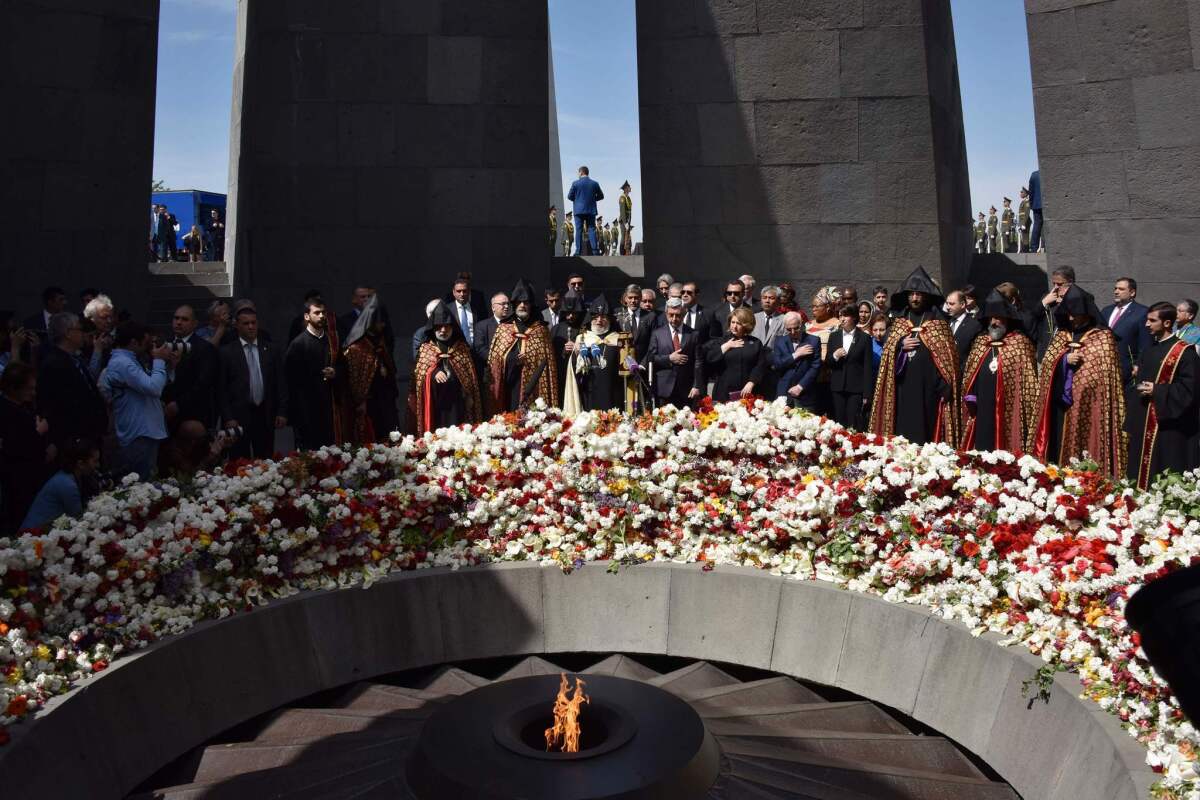Intersections: A survivor and an activist inspire hope

Armenian President Serzh Sarkisian and actor George Clooney were among those in attendance at a ceremony at the Genocide Memorial in Yerevan on April 24, 2016, to commemorate the 101st anniversary of the World War I-era Armenian genocide in the Ottoman Empire.
In a small room at an assisted-living facility in the suburbs of Detroit, I met a woman named Ramela who survived genocide and lived to share her story.
She is Michigan’s only living witness to the atrocities that befell the Armenian, Greek and Assyrian populations of the Ottoman Empire and part of a tiny population of centenarian survivors that we lose every year.
MORE: Read more of Liana’s columns >>
On her birthday, as she turned 102 years old, she told me about the lives she’s lived, the tribulations and triumphs she has endured, about the extraordinary and ordinary circumstances that have summed up her time on Earth.
I took a trip to the past with her, as we shared a box of chocolates, and exchanged laughs and words through the lens of three languages — English, Turkish and Armenian. I thought about resilience in the most tragic of circumstances, of how that kind of violence does not begin and end with life, but is a crime that kills for generations.
What does it mean to have your identity ripped from you, to feel uneven because you don’t know who you are, to spend most of your life rebuilding and rediscovering, only you don’t have to rebuild and rediscover just once, but over and over again?
I took a trip to the past with her, but 101 years after 1915, after the fate of Armenian populations changed forever, I also took a trip to the future, to a moment I have been waiting for my entire life.
On the 101st commemoration of the Armenian Genocide, an unprecedented event took place in Yerevan, the capital of Armenia. The 100 Lives initiative, co-founded by Vartan Gregorian, Ruben Vardanyan and Noubar Afeyan, gave Marguerite Barankitse, an awe-inspiring activist who has saved thousands of lives in Burundi during the years of civil war its inaugural Aurora Prize on behalf of the survivors of the Armenian Genocide and in gratitude to their saviors.
Barankitse received a $100,000 grant and the power to award a $1-million award to organizations that inspired her work.
“Our values are human values,” she said as she accepted her award. “When you have compassion, dignity and love, then nothing can scare you, nothing can stop you — no one can stop love. Not armies, not hate, not persecution, not famine, nothing.”
This was the moment that a real change began taking place in the atmosphere. This was a revolutionary moment. Yerevan was lit up — people from Kenya to Pakistan to the Central African Republic and everywhere in between were in the city, injecting a spark in its streets that I’ve never seen before. Even the likes of George Clooney, Ted Koppel and Charles Aznavour were there.
Armenia and its extended populations felt like they were part of something bigger, part of the world and most important of all: We were finally using our legacy to unite such a diverse group of people and giving back, sharing in the hope and progress that can grow from pain and not just wallowing in victimhood.
It was beautiful, and unexpectedly emotional. It felt like part of that deep-routed trauma had finally been washed away, that the weight of some of that history had lifted from those who had survived it, that the only people now carrying that burden more than ever were those denying its existence in the first place, that there was potential for reconciling and moving forward.
I left that night on a high, knowing that the next 100 years, or at least as many I was alive to witness, had more room for optimism than ever before, knowing that when I went to visit Ramela again, I could learn about the past, but also look toward a brighter future than ever before.
--
LIANA AGHAJANIAN is a Los Angeles-based journalist whose work has appeared in L.A. Weekly, Paste magazine, New America Media, Eurasianet and The Atlantic. She may be reached at liana.agh@gmail.com.